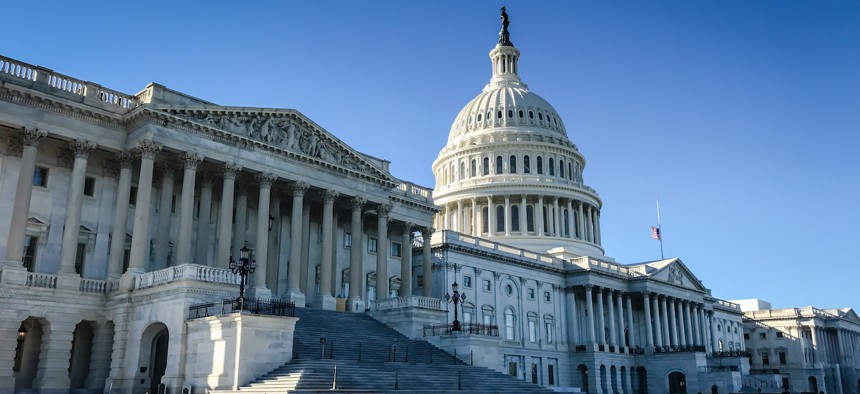
“H.R. 2670 also takes on the Biden administration’s attempts to put politics ahead of national security,” said House Rules Committee Chairman Tom Cole, R-Okla. mbell/Getty Images
House supports a 5.2% pay raise in its draft Defense policy bill, but slashes diversity initiatives
Committee leaders hope to end the National Defense Authorization Act's reputation as a Christmas tree for non-national security amendments.
House lawmakers this week will vote on an annual Defense policy bill that includes a 5.2% average pay raise for federal workers and members of the military and slashes Pentagon diversity initiatives.
The House version of the fiscal 2024 National Defense Authorization Act (H.R. 2670) effectively endorses President Biden’s plan to give service members and civilian federal employees the largest pay raise in decades in January. But, to Democrats’ dismay, the bill also includes a number of provisions that would crack down on the Defense Department’s efforts to improve diversity, equity and inclusion.
The bill eliminates the position of chief diversity officer at the department and bars the Pentagon from paying any employee tasked with implementing diversity, equity and inclusion initiatives more than $92,000. It also bars federal funds from being used to teach critical race theory, sets an end date for the Defense Advisory Committee on Diversity and Inclusion, and it bars federal funds from being used for “a drag show, drag queen story or similar event.”
The legislation also would task the secretary of Defense to audit the payrolls of employees operating with telework or remote work agreements to ensure they are receiving the correct locality pay. Office of Personnel Management guidance states that employees with telework agreements should be paid locality pay that corresponds with the location of their traditional work site, while remote workers should be granted locality pay that corresponds with where they live and work.
“H.R. 2670 also takes on the Biden administration’s attempts to put politics ahead of national security,” said House Rules Committee Chairman Tom Cole, R-Okla., at a committee hearing on the measure on Tuesday. “It rejects moves to indoctrinate our nation’s defense with progressive ideology by prohibiting things like critical race theory training and Green New Deal initiatives. The Pentagon should be laser focused on military readiness and preparedness, not appeasing extreme elements of the far left or far right.”
Democrats and the White House have announced their opposition to the provisions limiting diversity and inclusion initiatives at the Pentagon, although in a statement of administration policy on the bill, the Office of Management and Budget did not issue a formal veto threat over the measures.
“The administration strongly opposes the House’s sweeping attempts to eliminate the department’s longstanding DEIA efforts and related initiatives to promote a cohesive and inclusive force,” the White House wrote. “As articulated in the 2022 [National Defense Strategy], one of the department’s top priorities is building a resilient joint force and defense enterprise. DOD’s strategic advantage in a complex global security environment is the diverse and dynamic talent pool from which we draw.”
Rep. Adam Smith, D-Wash., ranking member of the House Armed Services Committee, said his Republican colleagues are mistaking valuable policy tools with political indoctrination.
“A diverse force is crucial; we currently have recruitment challenges, so we cannot take large groups of people and exclude them from the process,” Smith said. “I would remind the committee that 13 years ago, we finally allowed gay people to serve in the military. And I would remind the committee that at every single Republican voted against the Defense bill that year because of that. Can you honestly say that we would be better and safer if we took every single gay person and said, ‘You can’t serve in the military.’ This is about national security, not a left wing political agenda.”
In recent years, the NDAA’s reputation in Congress as a “must-pass” bill has led to it becoming a vehicle for provisions affecting the entire federal government, such as in 2019 when lawmakers included language authorizing up to 12 weeks of paid parental leave each year to the federal workforce. But House Armed Services Committee Chairman Mike Rogers, R-Ala., said Tuesday that his and Smith’s goal this year was to end that practice.
“I’ve heard concerns from members on both sides that over the past several years, the NDAA has turned into an omnibus authorization bill, filled with provisions that have little to do with defense,” he said. “In response, the bill before you today includes only provisions squarely within the jurisdiction of the Armed Services Committee. Whether that policy continues as this bill moves forward is up to you all, but as you consider which amendments to make in order, I would respectfully request you focus on amendments that advance the security of our nation and the needs of our service members.”
The House is expected to begin consideration of the NDAA on Thursday.







